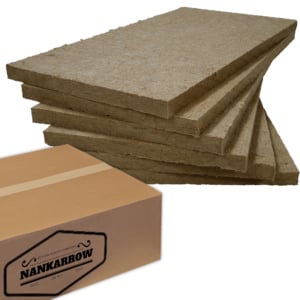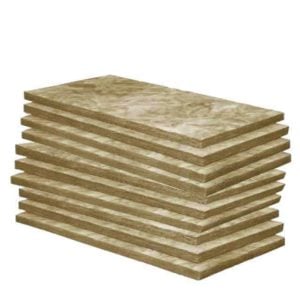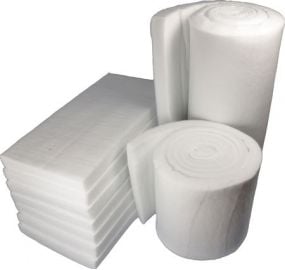Rock Wool & Mineral Wool
Showing all 3 results
-

Nankarrow GeoWool™ Premium Rockwool Slab Acoustic Panels
₹5,280.00 – ₹6,380.00 incl GST Select options -

Nankarrow GeoWool™ (80 sqft) Premium Rockwool Acoustic Panels – 30mm
₹4,950.00 incl GST Add to cart
Rock wool or mineral wool Sound Insulation is made from stone, with a non-directional fibre orientation and a higher density, which means it traps sound waves and dampens vibration. It’s not just heat that finds it tough to get through rock. ROCKWOOL products are also the most effective acoustic insulators used in construction.
Installing Rockwool / mineral wool insulation provides a real reduction in external noise from traffic or neighbours, or internal noise between floors and rooms. Our specialist products allow you to design the right acoustic environment for each space, whether it’s a school hall, a concert hall or the rooms of a new home.
Natural Sound Barrier
It’s the open, porous structure of stone mineral wool that makes it highly efficient in protecting against noise pollution. In ceilings, noise screens, around noisy machines, in walls, roofs and floors and even underneath rail tracks, ROCKWOOL acts as a natural and effective sound barrier. Easy to cut to fit around cables, pipes, sockets and services, RockWool Sound Insulation is quick and easy to friction fit without leaving gaps or cracks, which can significantly reduce performance. ROCKWOOL Sound insulation repels water and is vapour permeable, and resists rot and mould.
Being made from stone also means exceptional fire performance; capable of withstanding temperatures of up to 1,177C and achieving the highest fire resistance classification. ROCKWOOL Sound insulation is ideal for use in residential applications such as home offices, studies, recoprding studios, auditoriums, cinemas, bedrooms and bathrooms, and TV media and gaming rooms.
RockWool Features
- Excellent Acoustic performance
- Highest fire safety rating upto 1177 degrees celsius
- Water repellent and vapour permeable
- Resists rot and mould
- Easy to cut and fit
Applications of RockWool / Mineral Wool
Thermal Insulation
Rockwool offers excellent thermal insulation roll also offers exceptional fire protection, carrying the Euroclass A1 classification as well as the highest thermal performance.Rockwool is ideal for residential extensions and renovations – quick and easy to install to the highest standards so you can be sure every job is a better job. Being made from stone means ROCKWOOL is water repellent; however it also breathes, meaning it won’t trap moisture and will resist rot and mould, making it perfect for cavity walls. It also won’t slump or sag over time, delivering long-term thermal performance, ideal for use in the loft. And of course, because it’s ROCKWOOL and because it’s made from natural stone, it has unmatched fire resistance, protecting families and homes, as well as keeping energy bills low.
Sound Insulation
ROCKWOOL Sound Insulation is ideal for use in residential applications, such as home offices, studies, bedrooms, bathrooms and TV, media and gaming rooms. Made from stone, with a non-directional fibre orientation and higher density, ROCKWOOL Sound Insulation traps sound waves and dampens vibrations. But the performance is also in the fit – with easy to cut slabs, and fast friction fitting that leaves no gaps and won’t slump or sag. And of course, because it’s ROCKWOOL and because it’s made from stone, it has unmatched fire resistance – keeping families and homes, safe and sound
Suitable Surfaces
- Ceiling
- Walls
- Industrial Boilers
- Ovens
- Storage tanks
- Typical acoustic application in Theaters
- Multiplex Auditoriums Etc.
- Generator Rooms
RockWool Advantages
- Its high thermal efficiency reduces energy bills for heating and cooling in residential buildings due to the outstanding thermal resistance of the wool. The thermal resistance of a construction material is measured by what’s known as the R-value, with a higher number indicating that a substance can better resist thermal transfer. According to the Indian Department of Energy, fibreglass offers an R-value of 2.2 to 2.7 per inch, while Rockwool has an R-value of 3.0 to 3.3 per inch.
- Rockwool offers sound insulation due to its innovative materials that have higher densities and random fibre standard orientation that trap sound waves and deadens vibration time. For this reason it is perfect choice for spaces where the occupants are looking to minimise noise such as offices, bedrooms, meeting rooms or accommodation close to busy roads.
- It offers fire protection to the building and improved safety because it is made of rock that is fire resistant.
- Rockwool acts as a natural vapour barrier. This reduces the risk of mould and bacterial growth on the inside of the property.
- It constitutes a compression-resistant material that can be used as roofing boards or bonded panels. So it is ideal for thermal applications on domestic buildings such as extensions and loft conversions. It also useful for buildings subjected to change of use or layout that and there is a need to add internal partitions.
- It offers quick and easy installation providing airtightness to the building envelope.
- Improves the thermal comfort and air quality of the building offering a healthier environment to the occupants.
- Provides long term performance due to the unrivalled durability of rock that has unlimited lifetime. So there is no need for maintenance increasing the payback time of the intervention.
- It has minimum environmental impact because it reduces carbon footprint due to its natural origin and hazardous-free classifications that offer minimum embodied carbon. Additionally, it reduces the use of non-renewable energy sources such as gas and electricity contributing to air pollution reduction.
- Rockwool itself is sourced from natural and sustainable raw materials and perhaps more importantly it can be completely recycled when the building is no longer in use without producing waste – All of the Rockwool waste can be reused as a raw material in the manufacturing process, producing brand new insulation.
Here are some more of the key advantages of mineral wool in acoustic applications:
- Sound Absorption: Mineral wool has excellent sound absorption properties, meaning it can effectively reduce the reflection of sound waves. When used as an acoustic insulation material, mineral wool absorbs sound energy, reducing echo and reverberation within a space. This helps improve speech intelligibility, minimize noise distractions, and enhance overall acoustic comfort.
- Broad Frequency Range: Mineral wool is effective across a broad frequency range, including low, mid, and high frequencies. This versatility makes it suitable for addressing various types of noise, such as airborne noise, impact noise, and vibration-related noise.
- High Sound Transmission Class (STC) Ratings: Mineral wool insulation can contribute to achieving high Sound Transmission Class (STC) ratings. STC is a rating system that measures the sound transmission loss through a partition, such as walls, floors, or ceilings. By using mineral wool in these partitions, the overall sound insulation performance can be improved, reducing sound transmission between different spaces.
- Fire Resistance: Mineral wool is inherently fire-resistant. It can withstand high temperatures without igniting or melting, making it a safe choice for acoustic applications. Its fire-resistant properties help improve the fire safety of buildings and reduce the risk of spreading flames and smoke.
- Thermal Insulation: In addition to its acoustic benefits, mineral wool also provides thermal insulation. It helps regulate temperature by reducing heat transfer, preventing the loss of warmth in cold environments and the entry of heat in hot climates. This thermal insulation property contributes to energy efficiency and comfort within a space.
- Mold and Moisture Resistance: Mineral wool is resistant to mold, mildew, and moisture absorption. It does not support the growth of fungi, which helps maintain indoor air quality and prevents the development of unpleasant odors and health issues associated with mold.
- Durability and Longevity: Mineral wool is a durable material that retains its acoustic and thermal properties over time. It does not degrade easily and has a long lifespan, making it a reliable choice for acoustic insulation in various applications.
It’s important to note that while mineral wool offers excellent acoustic benefits, proper installation techniques and other factors, such as the density and thickness of the material, also play a role in achieving optimal acoustic performance. Consulting with experts or following manufacturer guidelines is recommended when using mineral wool for acoustic applications.

